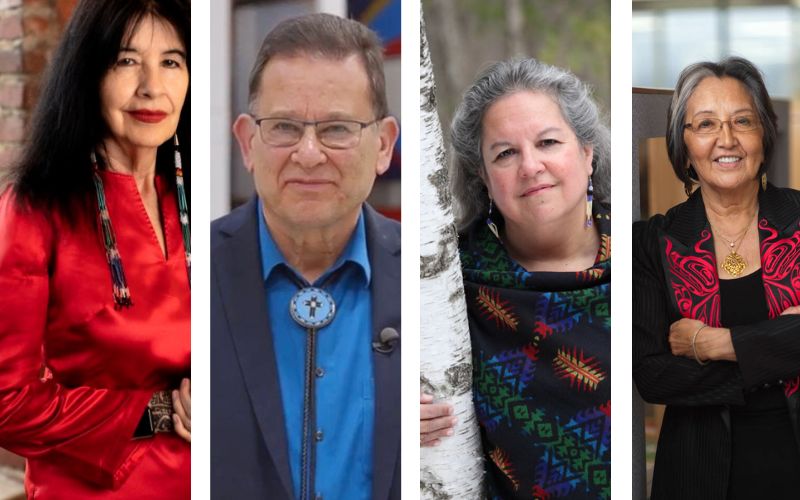
- Details
- By Kaili Berg
In a historic recognition of Indigenous excellence, President Joe Biden presented the 2022 and 2023 National Humanities Medals in a private ceremony at the White House yesterday.
Among the distinguished recipients are four individuals who have made remarkable contributions to Indian Country: Joy Harjo, Robin Wall Kimmerer, Robert Martin and Rosita Worl.
These honorees, known for their work in poetry, environmental scholarship, and higher education for Indigenous peoples, are being celebrated for their roles in deepening the nation’s understanding of the human experience and advancing the cultural life of the United States.
President Biden’s recognition of these leaders at the 2022-2023 National Humanities Medals ceremony honored their lifelong commitments to uplifting Indigenous communities, preserving cultural heritage, and advancing education for future generations.
"With absolute courage, you combat racial stereotypes, confront ghosts of history and speak truth to power—as Jill Biden's husband, I know the power of women in this room," President Joe Biden said during a reception at the White House following the medal ceremony. "The artist's gift is a sixth sense, to imagine something that no one else can carve, paint, write, sing, dance or film until they set their vision free."
The ceremony was livestreamed on the White House website with remarks by President Biden, First Lady Dr. Jill Biden, and key figures in the arts and humanities, including National Endowment for the Humanities Chair Shelly C. Lowe, a Navajo citizen who has been an advocate for advancing Indigenous knowledge systems in academia.
"In paintings and films and songs and scenes, poetry and history, they've uncovered the memories we didn't know we held onto and the dreams we didn't dare say out loud," First Lady Jill Biden said during the White House reception. "And they remind us of the transcendent moments of truth and beauty, and that they are not out of our reach."
These honorees, alongside other distinguished recipients, represent a significant moment for Indian Country as their contributions to the nation’s cultural fabric are celebrated on a national stage.
Here are the awardees of the 2022 and 2023 National Humanities Medals making waves in Indian Country:
Joy Harjo: Poet
Joy Harjo, the first Native American U.S. Poet Laureate and a member of the Muscogee (Creek) Nation, is a recipient of the 2022 National Humanities Medal. Harjo’s poetry reflects the depth and resilience of Indigenous life, infusing her works with a blend of history, myth, and personal narrative. Her influence extends beyond literature, serving as a powerful voice for Indigenous communities and helping to preserve their languages and traditions. Throughout her three terms as Poet Laureate, Harjo worked to highlight Native writers and promote Native literature, strengthening cultural awareness on a national scale.
Robin Wall Kimmerer: Scholar and Environmental Advocate
Robin Wall Kimmerer, a member of the Citizen Potawatomi Nation, is a 2023 National Humanities Medalist and an esteemed scholar whose work bridges Indigenous wisdom and environmental science. As a botanist, Kimmerer’s renowned book Braiding Sweetgrass: Indigenous Wisdom, Scientific Knowledge, and the Teachings of Plants has become a cornerstone in the fields of environmental education and ecological restoration. Her writings explore the connection between humans and nature, emphasizing the importance of reciprocity and the responsibility we have toward the environment. Kimmerer’s work has expanded public awareness of Indigenous ecological knowledge and the value it holds for addressing modern environmental challenges, making her an important advocate for sustainability and Indigenous rights.
Robert Martin: Champion of Indigenous Higher Education
Robert Martin, also recognized as a 2022 National Humanities Medalist, has been a transformative leader in Indigenous higher education. As the longtime president of the Institute of American Indian Arts (IAIA) in Santa Fe, New Mexico, Martin has played a pivotal role in promoting educational opportunities for Native students and advancing the arts within Indigenous communities. Under his leadership, IAIA has become a nationally recognized institution for Native art and cultural education, providing a platform for Native artists to preserve their cultural heritage while exploring new creative expressions. Martin’s work has strengthened the future of Native art and empowered generations of Indigenous students to pursue higher education, making him a deserving recipient of the National Humanities Medal.
Rosita Worl: Anthropologist and Cultural Leader
Rosita Worl, a 2023 National Humanities Medalist and Tlingit anthropologist, has dedicated her life to preserving and advancing Indigenous cultures. As the president of the Sealaska Heritage Institute, Worl has been a leader in protecting the traditions, languages, and history of Alaska Native people. Her work has been instrumental in promoting cultural revitalization and the education of younger generations about their heritage.
More Stories Like This
Vision Maker Media Honors MacDonald Siblings With 2025 Frank Blythe AwardFirst Tribally Owned Gallery in Tulsa Debuts ‘Mvskokvlke: Road of Strength’
Zuni Youth Enrichment Project and Partners at Ho’n A:wan Productions Launch 8th Annual Delapna:we Project
Chickasaw Holiday Art Market Returns to Sulphur on Dec. 6
Center for Native Futures Hosts Third Mound Summit on Contemporary Native Arts
Help us defend tribal sovereignty.
At Native News Online, our mission is rooted in telling the stories that strengthen sovereignty and uplift Indigenous voices — not just at year’s end, but every single day.
Because of your generosity last year, we were able to keep our reporters on the ground in tribal communities, at national gatherings and in the halls of Congress — covering the issues that matter most to Indian Country: sovereignty, culture, education, health and economic opportunity.
That support sustained us through a tough year in 2025. Now, as we look to the year ahead, we need your help right now to ensure warrior journalism remains strong — reporting that defends tribal sovereignty, amplifies Native truth, and holds power accountable.
 The stakes couldn't be higher. Your support keeps Native voices heard, Native stories told and Native sovereignty defended.
The stakes couldn't be higher. Your support keeps Native voices heard, Native stories told and Native sovereignty defended.
Stand with Warrior Journalism today.
Levi Rickert (Potawatomi), Editor & Publisher


